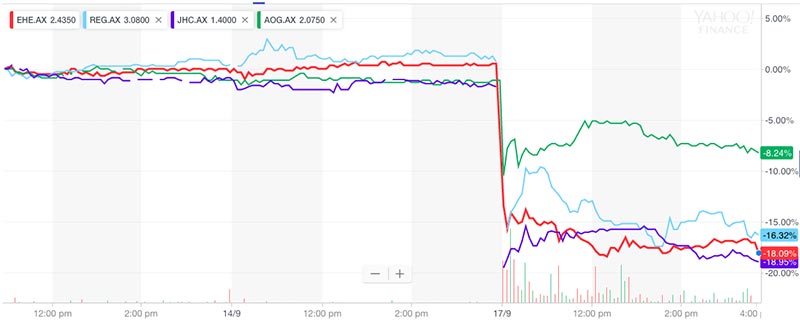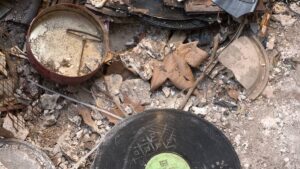Aged care stocks are recovering this morning after yesterday’s big falls

Pic: Godji10 / iStock / Getty Images Plus via Getty Images
Aged care-related stocks plunged on Monday after Prime Minister Scott Morrison called for a Royal Commission into the sector over the weekend and the ABC aired a scathing report on Four Corners on Monday night.
But the four key ASX-listed aged care stocks — Estia, Regis, Japara and Aveo — started Tuesday in positive territory, despite ABC-TV’s Four Corners last night airing appalling stories collected from some 4000 Australians with relatives in aged care homes.
On Monday the four stocks lost between 8 per cent and 20 per cent of their value (see below).
But at the start of trade on Tuesday all four opened 3 to 5 per cent higher.
Last night Four Corners reported aged care homes were feeding residents on a budget of $6 per day, restricting the number of incontinence products, staffing one nurse for up to 150 people and even over-dosing dementia patients to make them more manageable.
The program will air more allegations in the second part of its investigation next week.
“I acknowledge the system is broken,” Prime Minister Morrison said on Channel 9’s Today Show on Monday.
“I acknowledge a Royal Commission is necessary to understand the full extent of the problem that our increased policing work in the sector has been revealing, and that’s why we need a royal commission.”
Investors dumped $75 million worth of shares from the four companies on Monday.
On Monday, Estia Health (ASX:EHE), which operates 68 aged care homes, fell 19 per cent to an intraday low of $2.38. More than $25 million worth of shares changed hands.
The $770 million business said it “supported Prime Minister Scott Morrison’s call for a Royal Commission into Australia’s aged care sector” and “welcomed scrutiny of the sector”.
“We will continue to work with government to build a viable sector that older Australians deserve,” Estia chief Norah Barlow told investors on Monday morning.
Estia “looks forward to engaging in the consultation with government on the erms of reference for the Commission”.

Japara (ASX:JHC), which operates 48 homes, dropped 21 per cent on Monday to a low of $1.31. Some $12 million of stock was offloaded.
“Japara has always focused on high standards of care for our residents,” the company said in a statement.
“We welcome the Commission with the hope that it facilitates further reform to the sector that supports better outcomes for all aged care residents now and in the future, as well as providing long term sustainability for our important industry,” said Japara boss Andrew Sudholz.
Regis Healthcare (ASX:REG) fell 20 per cent to a low of $2.90 with $20 million of shares sold.
The $2 billion Regis is one of Australia’s biggest aged healthcare providers — but has so far been silent on the scandal.
It’s in the middle of opening ten new facilities and just reported a $54 million profit on higher revenue of $595 million.
Aveo Group (ASX:AOG), which was last year the subject of another investigation by Fairfax and the ABC’s Four Corners into its retirement village fees — fell 14 per cent to an intraday low of $1.92.
About $19 million of stock was sold. Aveo also has yet to make a statement on the Royal Commission.
Four Corners investigation
Prime Minister Morrison launched the latest Royal Commission ahead of the two-part ABC-TV Four Corners investigation which on Monday revealed how far the industry still had to go despite new legislation and a government review.
The review followed a damning review last year of the state-run Oakden Older Persons Mental Health Service.
The report found residents were over-medicated, physically and sexually abused, and isolated.
Next week will mark 12 months since South Australia’s Oakden aged care facility was closed, and one aged care facility has been closed a month since.
In the 2018 budget the government offered an extra $1.6 billion for better home care, and last week said they’d introduce a bill to create an Aged Care Quality and Safety Commission, funded to the tune of $106 million.
A hard industry to make money from
While it may look like a buying opportunity in aged care stocks, analysts told Stockhead the sector is difficult to make money in.
The sector is mostly funded by the federal government with means tested contributions from residents that are capped at $244 a day.
It’s also high regulated and the rules can change at short notice.
An analysis of the top three listed companies Japara, Estia and Regis by accountancy firm Stewart Brown found that weak financial results in fiscal 2018 reflected a freeze on government funding indexation and scoring changes; occupancy pressures; and increases in staff costs.
One of the biggest costs in aged care are wages — and there are calls for further pay increases to increase quality of care.
High fixed costs means facilities need consistently high occupancy rates.
Japara and Regis also said a bad flu season and an outbreak of gastroenteritis in the first six months of fiscal 2018 caused occupancy rates to be lower than usual — and that impacted on revenue.
- Subscribe to our daily newsletter
- Bookmark this link forsmall cap news
- Join our small cap Facebook group
- Follow us on Facebook or Twitter
Japara, Estia and Regis all listed in 2014 and all are underwater on their listing prices of $2, $5.75 and $3.65 respectively.
Aveo rebranded in 2013, but began a steep share price slide in 2017.
In Stewart Brown’s earlier Aged Care Financial Performance Survey Residential Care Report in March, the accounting firm said government changes and rising costs “has resulted in many facilities moving into an increasingly financially vulnerable position”.
“The declining residential care financial performance for the nine months ended 31 March 2018 continues to be a concern for the sector and its ongoing financial viability,” the report read.
‘The headline results are that 43.1 per cent of facilities reported an overall EBT loss (deficit) with 21 per cent reporting an EBITDA loss which is a cash loss.
“With continued headlines such as these it will be difficult to promote or stimulate future capital; and equity investment into residential care.
Facilities in both regional and metropolitan areas are seeing rising losses.
UNLOCK INSIGHTS
Discover the untold stories of emerging ASX stocks.
Daily news and expert analysis, it's free to subscribe.
By proceeding, you confirm you understand that we handle personal information in accordance with our Privacy Policy.








